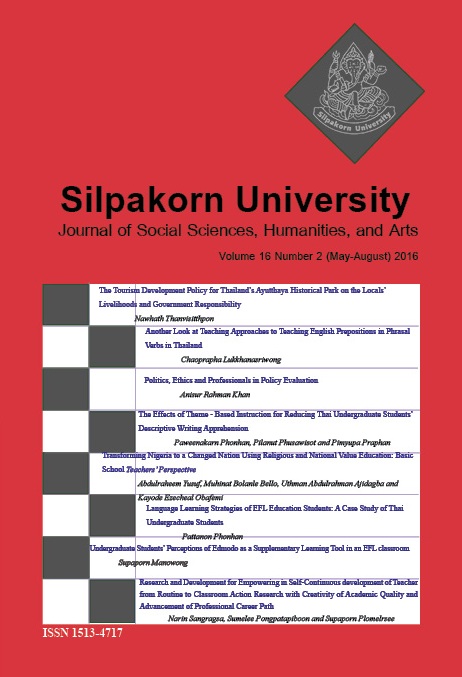The Effects of Theme - Based Instruction for Reducing Thai Undergraduate Students’ Descriptive Writing Apprehension
Main Article Content
Abstract
In the field of second language writing, there has been emphasis on the study of relationship between L2 learners and their writing apprehension for the past three decades. This research was aimed to reduce Thai undergraduate students’ descriptive writing apprehension and develop their writing proficiency through theme-based instruction. The subjects of the study were third-year English major students, enrolled in the Narrative and Descriptive Composition Course in the first semester of academic year 2014 at Mahasarakham University. All of them were purposively grouped according to the level of writing apprehension. The research instruments in this study were six lesson plans, writing apprehension test based on Daly and Miller’s framework (1975), semi- structured interview and students’ diary. The data analysis was computed through the SPSS statistical package for means, standard deviation, percentage and t-test. The findings revealed that prior to employing theme-based instruction; the students’ writing apprehension was at the medium level with their average at 2.94. However, after theme-based was adopted, the students’ writing apprehension was reduced to 2.45 and overview of writing apprehension level was statistically significant at the level of .05. Focusing on writing ability from drafting, it was demonstrated that students’ writing ability was clearly higher; that is, 58.83% for draft 1, 65.48% for draft 2 73.48 % for draft 3 respectively. Similarly, the students have increased writing ability from pre-test to post-test when the pre-test average was at 56.16 and post-test average at 74.84.
Downloads
Article Details
All rights reserved. Apart from citations for the purposes of research, private study, or criticism and review,no part of this publication may be reproduced, stored or transmitted in any other form without prior written permission by the publisher.
References
Brinton, D. M., Snow, M. A. and Wesche, M. B. (1998) Content-Based Second Language Instruction. Boston: Heinle & Heinle.
Butler, K. (n.d.) Descriptive Essay Rubric. [Online URL: https://kentbutler.pbworks.com/w/page/1133] accessed on July 21, 2014.
Cheng, Y. S. (2004) A Measure of Second Language Writing Anxiety: Scale Development and Preliminary Validation. Journal of Second Language Writing 13: 313 – 335.
Chaopong, C. (2012) An Instructional Model to Reduce Thai High School Students’ Foreign Language Writing Anxiety: An Integration of Social Cognitive Theory and Process Writing. Master Thesis, Mahasarakham University, Mahasarakham, Thailand.
Crandall, J. (1994) Content-Centered Language Learning. Internet ERIC Digest, ED 367142.
Daly, J. A. and Miller, M. D. (1975) The Empirical Development of an Instrument to Measure Writing Apprehension. Research in the Teaching of English 9: 242-249
Davies, S. (2003) Content-Based Instruction in EFL Contexts.The Internet TESL Journal 9(2). [Online URL: https://iteslj.org/. Articles/Davies-CBI.html] accessed on. September, 2015
Grabe, W. and Stoller, F. L. (1997) A Six – T’s Approach to Content-Based Instruction. In The Content-Based Classroom: Perspectives on Integrating Language and Content, edited by Snow, M. A. and Brinton, D. M., pp.82- 85. New York: Longman
Horwitz, E. K. (1986) Foreign Language Classroom Anxiety. The Motion Language Journal 70: 125–132.
Hyland, K. (2003) Second Language Writing. New York: Cambridge University Press
Manphonsri, S. (2012) An Instruction Model to Reduce Thai High School Students, Foreign Language Writing Apprehension Using Vygosky’s Scaffolding Techniques. Master Thesis, Mahasarakham University, Mahasarakham, Thailand.
Osman, S. R. F. (2009) Nurturing Writing Proficiency through Theme-based Instruction. International Education Studies 2(3): 140–145.
Pansue, S. (2008) Use of Scaffolding Strategies to Promote Writing and Decrease Writing Anxiety of Expanding Level Students. Master Thesis, Chaingmai University, Chaingmai, Thailand.
Perl, S. (1980) A look at basic Writers in the Process of Composing. In Basic Writing, edited by L. N. Kasden and D. R. Hoeber. Urbara: National Council of Teachers of English, pp. 13-32.
Phetmeekaew, P. (2012) Using One on One Writing Conference Based on Rogerian Techniques to Reduce Foreign Language Writing Apprehension: A Case Study of Thai Technical Students. Master Thesis, Mahasarakham University, Mahasarakham, Thailand.
Reeves, L. (1997) Minimizing Writing Apprehension in the Learner Centered Classroom. English Journal pp.38-40
Smith, M. W. (1984) Reducing Writing Apprehension.Urbana, IL: National Council of Teachers of English
Senaloy, A. (2012) An Instructional Model to Enhance Writing Ability of Thai High School Learners of English: An Integration of Process Writing and Theme- Based Instruction. Master Thesis, Mahasarakham, University, Mahasarakham, Thailand
Snow, M. A. and Brinton, D. M. (1997) The Content- Based Classroom: Perspectives on Integrating Language and Content. New York: Longman
Snow, M. A. (1991) Teaching Language through Content:Teaching English as a Second or Foreign Language. Boston: Heinle& Heilne.
Sommers, N. (1980) Revision Strategies of Student Writers and Experienced Adult Writers. College Composition and Communication 31(4): 378-388.
Tedick, D. J. (1988) The Effects of Topics Familiarity on the Writing Performance of Non-Native Writers of English at the Graduate Level. Ph.D Dissertation, The Ohio State University, Ohio, United States.
Watcharapunyapong, S. And Usaha, S. (2013) Thai EFL Student’s Writing Errors in Different Text Types. The Interference of The First Language Teaching 6(1): 67-77.
Wongduangchan, S. (2014) An Instructional Model to Decrease Writing Apprehension Using Coaching Peers for Effective Response for Thai Junior High School Students. Master Thesis, Mahsarakham University, Mahsarakham, Thailand.
Zamel, V. (1983) The Composition Processes of Advanced ESL Students. Six Case Studies. TESOL Quarterly 17: 165-18


